Artificial intelligence for hotel business is reshaping the hospitality industry in 2025. Hotels now see AI as essential for staying ahead. Many properties rely on solutions like FanRuan and FineChatBI to connect data, improve guest service, and drive performance.
The hospitality industry in 2025 has seen rapid changes due to artificial intelligence for hotel business. AI now plays a central role in almost every part of hotel operations. Agentic AI stands out as a major trend. This technology allows AI agents to work alongside human staff, making workflows smoother and improving customer service. Hotels use AI to build unified data systems and create better connections between people and technology.
AI in hospitality brings several important trends:
Artificial intelligence for hotel business helps hotels make better decisions about pricing, guest segmentation, and demand forecasting. AI automates repetitive tasks and answers common guest questions. This frees hotel staff to focus on high-touch, personalized service, which leads to higher guest satisfaction.
FanRuan leads the way in providing data-driven solutions for the hospitality industry. The company’s platforms, such as FineChatBI, give hotels powerful conversational analytics. FineChatBI allows hotel managers to ask questions in natural language and receive clear, actionable insights. This tool helps hotels understand guest behavior, track trends, and make fast decisions.
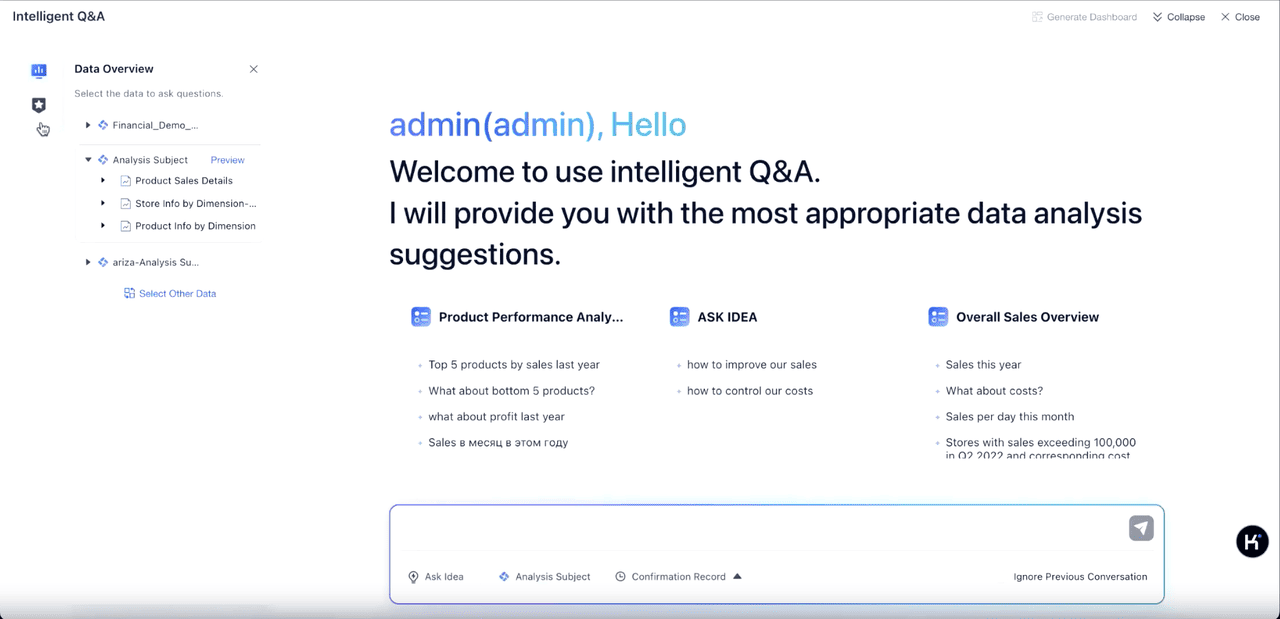
FanRuan’s solutions support real-time data integration and analysis. Hotels can connect data from many sources, including booking systems, guest feedback, and IoT devices. This unified approach helps hotels respond quickly to changing guest needs and market conditions. FanRuan’s focus on innovation and customer-centric design makes it a trusted partner for hotels that want to use AI in hospitality to improve operations and guest experiences.
Tip: Hotels that use advanced AI-driven tools like those from FanRuan often see faster service delivery, improved guest satisfaction, and stronger revenue growth.
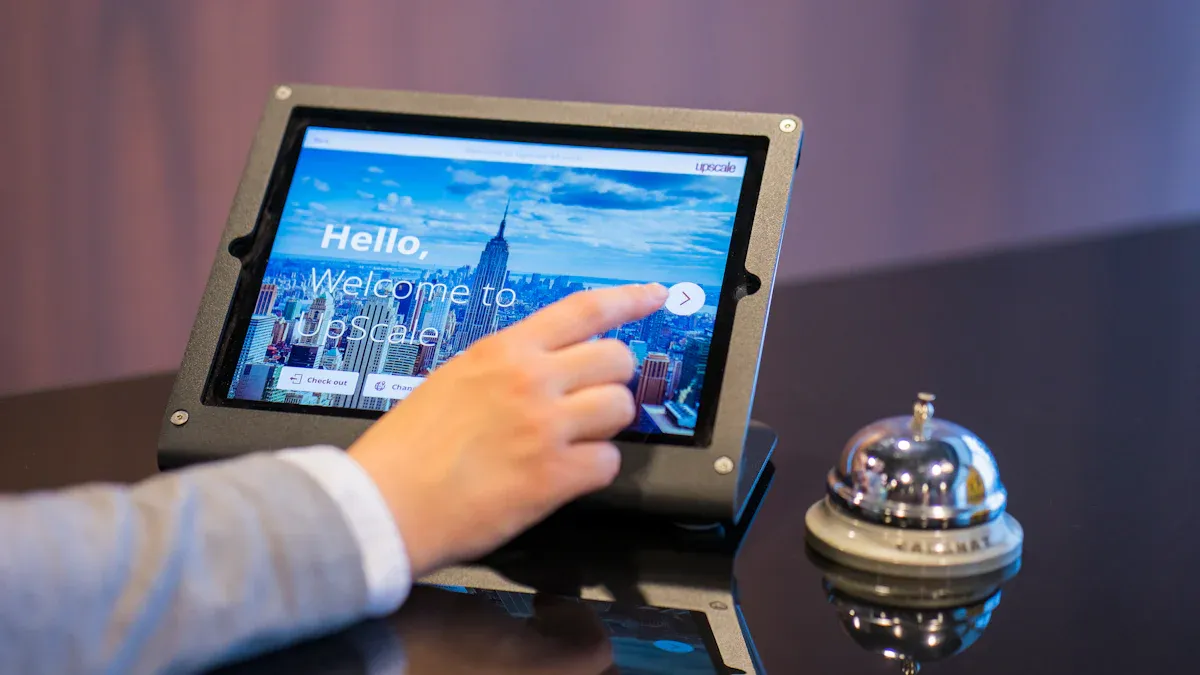
Artificial intelligence has transformed the way hotels deliver personalized guest experiences. AI tools now analyze guest data to identify booking behavior and preferences. This allows hotels to improve their offerings and create marketing campaigns that match what customers want. Many hotels use contactless experiences, such as digital keys and virtual assistants, to let guests control lighting, temperature, and room service with voice commands. These features help create a personalized environment for every guest.
AI also personalizes entertainment by recommending streaming or gaming content based on previous choices. Hotels use AI-driven advertising to offer room upgrades, exclusive services, and tailored packages. More than half of hotel executives already use AI for marketing personalization. Some hotels even create targeted sub-brands for specific customer groups, such as business travelers or millennials, without building new infrastructure. Voice-activated AI assistants handle service requests and provide local information, improving communication and the overall guest experience.
The Otonomus Hotel in Las Vegas shows how AI-driven personalization works in practice. Guests can customize rooms and services through digital platforms, adjusting lighting, temperature, and entertainment. AI analyzes guest preferences and behaviors to anticipate needs before arrival, creating hyper-personalized experiences. AI assistants operate around the clock to handle requests and optimize services, working alongside human staff. Experts say that AI increases speed and efficiency in customer service while keeping the human touch for emotional connection. This balance is key to redefining guest experiences and meeting modern expectations.
AI customizes hotel services by analyzing customer data to offer personalized booking recommendations, including hotel choices and add-ons tailored to guest preferences. For example, Hyatt partnered with Amazon Web Services to use AI-driven data analysis, which led to a $40 million revenue increase in six months. AI integrates with Internet of Things devices to automate and personalize in-room environments, such as lighting, temperature, and entertainment systems. AI-powered virtual assistants and chatbots provide 24/7 personalized customer service, handling requests and offering recommendations. AI also enables tailored dining experiences by accommodating dietary restrictions and personalizing ambiance like lighting and music. AI maps the entire guest journey by suggesting amenities, room types, transfers, dining, and activities based on past behavior, time of day, and weather. Studies show that personalization driven by AI increases customer satisfaction and willingness to pay more, with 61% of guests valuing customized experiences and 78% more likely to book hotels offering personalization.
Guest profiling uses AI to improve personalized guest experiences by analyzing data from past stays, preferences, and feedback. AI recommendation systems suggest activities and dining options tailored to each guest. Predictive analytics help manage room availability and maintenance, ensuring smooth and comfortable stays. AI-powered chatbots provide 24/7 personalized support, making communication easier for customers.
AI uses machine learning to analyze guest data, such as past behaviors and preferences, to tailor services uniquely to each guest. Personalized services include adjusting room settings automatically based on previous stays. Natural language processing powers chatbots and virtual assistants that provide 24/7 personalized communication and support. AI recommendation engines suggest tailored travel packages, dining options, and local activities matching guest preferences. Predictive analytics enable hotels to anticipate guest needs and optimize marketing and service delivery. Dynamic pricing models adjust offers based on guest profiles and market conditions, enhancing personalization and revenue. AI continuously learns and improves its predictions, leading to increasingly accurate and personalized guest experiences over time.
FineChatBI empowers hotels to deliver personalized guest experiences by providing real-time guest data analysis and personalized recommendations. This conversational AI module integrates with FineBI and allows hotel managers and staff to interact with data using natural language. FineChatBI supports multi-turn conversations with contextual understanding, so users can ask follow-up questions and get deeper insights.

Hotels use FineChatBI to analyze guest feedback, booking patterns, and service requests in real time. This enables staff to deliver hyper-personalized experiences, anticipate customer needs, and respond quickly to changing preferences. By leveraging FineChatBI, hotels can create memorable guest experiences, improve operational efficiency, and build stronger customer loyalty.
Research shows that AI-driven hyper-personalization in hospitality significantly enhances guest satisfaction by enabling highly customized services that increase customer happiness and brand loyalty. AI-powered interactions, dynamic pricing, and personalized advice positively influence guest perceptions and behaviors. Despite challenges such as data privacy and ethical concerns, AI personalization offers hotels a competitive advantage by improving operational efficiency and guest experiences.

Artificial intelligence has become a driving force in streamlining operations across the hospitality industry. Hotels now use AI to automate routine tasks, optimize resource allocation, and improve operational efficiency. This shift allows staff to focus on delivering exceptional guest experiences while technology handles repetitive work.
AI-powered automation transforms daily hotel operations. Chatbots provide 24/7 customer support, answering booking questions and handling multilingual communication. Robotics assist with housekeeping and room service, taking care of repetitive tasks and freeing staff for guest-facing roles. AI systems analyze real-time data to assign housekeeping tasks, optimize cleaning schedules, and manage inventory. These tools help hotels streamline operations and reduce errors.
| Improvement Area | Description | Measurable Outcome / Example |
|---|---|---|
| Front Desk Workload Reduction | Mobile check-ins and AI chatbots reduce guest wait times and front desk interactions. | Prague Residences saved $10,000 monthly on staffing |
| Staff Scheduling & Housekeeping | Automated task scheduling and real-time updates optimize staff workloads and reduce bottlenecks. | Improved housekeeping efficiency and task management |
| Energy Management | AI-driven smart systems adjust heating, cooling, and lighting based on occupancy. | Reduced energy costs and promoted sustainability |
| Predictive Maintenance | AI predicts equipment maintenance needs to reduce downtime and extend asset lifespan. | Less downtime and maintenance costs |
| AI Chatbots & Robotics | Chatbots handle multiple guest inquiries simultaneously; robots assist in service delivery. | Frees staff for personalized guest interactions |
AI task assignment uses real-time room status and guest data to create efficient cleaning routes. For example, the Ritz-Carlton increased housekeeping efficiency by 20% after implementing AI-driven scheduling. Hotels also use AI to pre-stock amenities and adjust room settings before guests arrive, which increases loyalty and repeat visits. Surveys show that AI in housekeeping leads to a 30% reduction in scheduling time and a 15% increase in guest satisfaction.
A hotel chain that adopted AI for occupancy analysis and guest preference tracking saw improved staff productivity and lower operational costs. Rooms were always ready on time, and housekeeping staff could focus on personalized services. AI also integrates with property management systems and IoT devices, sending real-time updates to staff and optimizing cleaning schedules. This reduces unnecessary guest disturbances and physical strain on staff, further streamlining operations.
Tip: Hotels that automate routine tasks with AI see measurable improvements in operational efficiency, guest satisfaction, and cost savings.
Predictive maintenance powered by AI changes how hotels manage equipment and facilities. AI analyzes data from IoT sensors to predict when equipment might fail. This allows hotels to schedule repairs during off-peak hours, minimizing disruptions for guests and staff. AI-driven maintenance reduces unexpected expenses by preventing costly repairs and avoiding guest dissatisfaction.
Predictive maintenance shifts hotels from reactive to proactive management. Real-time data and AI analytics help optimize maintenance timing and reduce downtime. This leads to better resource management and supports sustainable hotel operations.
FanRuan’s FineDataLink plays a crucial role in streamlining operations and boosting operational efficiency. FineDataLink is an enterprise-level data integration platform that connects and transforms data from many sources. Its intuitive low-code interface makes complex data integration simple, enabling real-time synchronization with minimal latency.
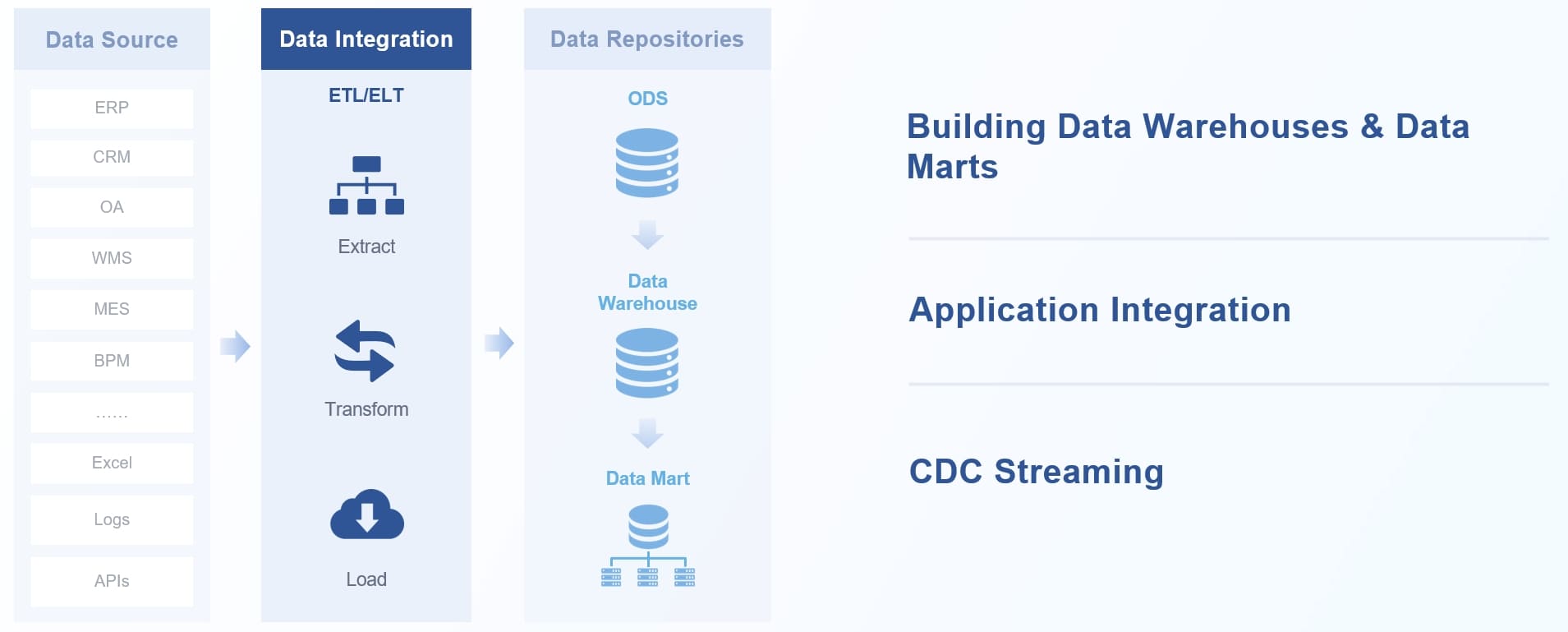
Hotels use FineDataLink to integrate data from booking systems, guest feedback, IoT devices, and more. This real-time data integration enables hotels to automate workflows, monitor performance, and make informed decisions quickly. By centralizing data, FineDataLink helps hotels streamline operations, reduce manual work, and improve operational efficiency.
Note: FanRuan’s FineDataLink empowers hotels to build a high-quality data layer for business intelligence, supporting smarter decision-making and sustained growth.
AI has changed how hotels approach revenue management. Hotels now use AI to analyze booking trends, competitor rates, and local events. This technology helps set room prices in real time. For example, Marriott International used an AI-powered dynamic pricing system during a major sporting event. The result was a 17% increase in revenue per available room and higher customer satisfaction. AI systems monitor many factors at once and update prices even outside business hours. Machine learning models learn from past outcomes and refine pricing recommendations. This approach allows hotels to respond quickly to market changes, demand surges, and seasonality. Independent hotels benefit as AI acts as an automated second set of eyes, spotting trends and adjusting strategies. Dynamic pricing powered by AI leads to revenue maximization, better competitive positioning, and operational efficiency.
Hotels that use AI for dynamic pricing often see revenue lifts of up to 9% and, in some cases, over 30% growth in revenue per available room.
Smart marketing strategies rely on AI and advanced revenue management tools. AI improves forecasting accuracy, reducing errors by up to 50%. This enables better pricing and inventory decisions. Hotels using AI-driven revenue management have seen average revenue increases of 10% and occupancy boosts of 10%. AI analyzes customer booking history and preferences to recommend tailored packages and predict future behaviors. This increases guest loyalty and repeat bookings. AI-powered chatbots provide instant, 24/7 customer support, handling inquiries and booking changes. This frees staff for more complex tasks and improves the customer experience.
AI-driven smart marketing campaigns increase repeat business by 10% and positive reviews by 15%. Competitive intelligence from AI can boost revenue by up to 5% by analyzing market trends and competitor activity.
FineChatBI supports hotels in making data-driven decisions for revenue management and smart marketing. This conversational BI tool allows managers to ask questions in natural language and receive actionable insights. FineChatBI connects to multiple data sources, providing a unified view of customer behavior, booking patterns, and campaign performance. The tool helps hotels optimize dynamic pricing, forecast demand, and adjust marketing strategies in real time.
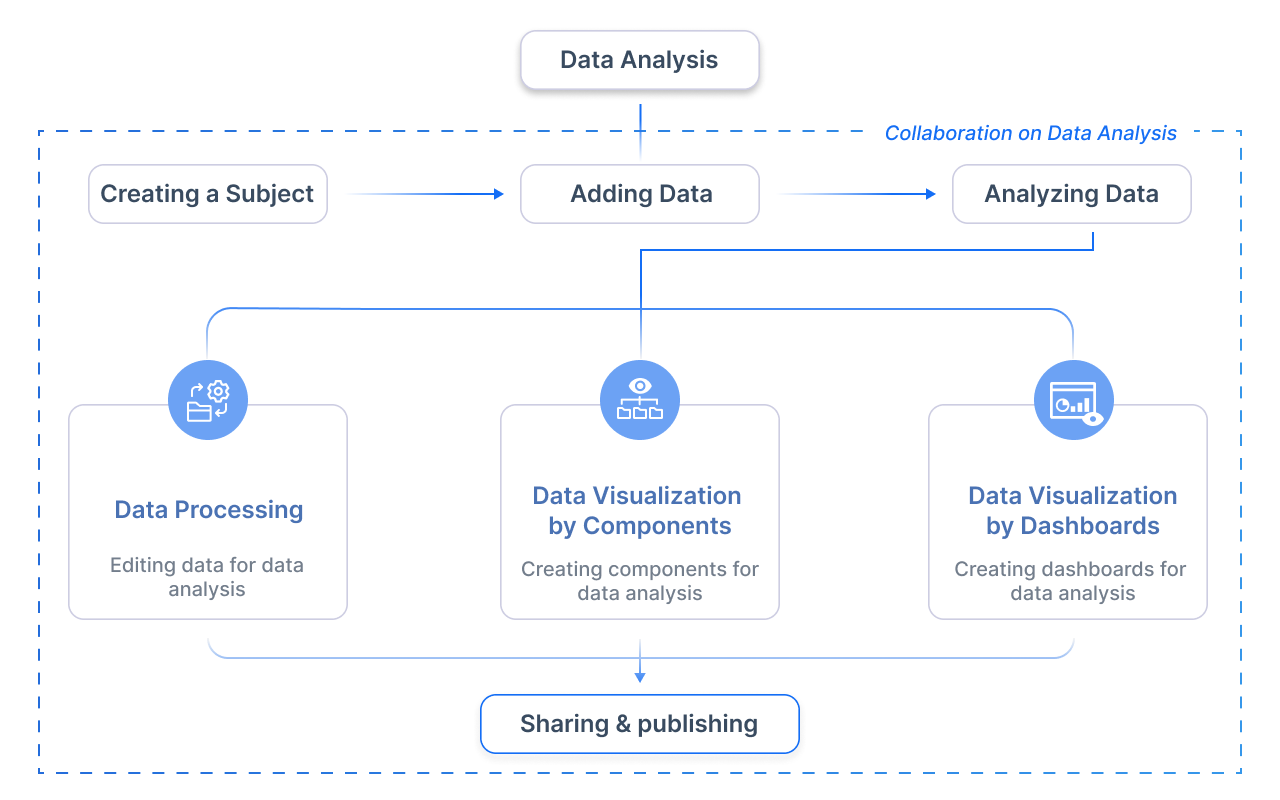
FineChatBI also enables hotels to segment audiences, monitor campaign results, and identify new opportunities for growth. By using FineChatBI, hotels can automate workflows, increase staff productivity, and focus on strategic revenue management. This leads to higher occupancy, improved customer satisfaction, and sustained business growth.
Smart marketing powered by AI and FineChatBI gives hotels a competitive edge in a fast-changing market.
AI-powered virtual assistants have become essential for enhancing customer service in hotels. These assistants provide instant, 24/7 support, handling multiple guest queries at once. Guests receive personalized experiences because virtual assistants analyze past bookings and preferences. They offer tailored recommendations for room settings, dining, and activities. AI chatbots facilitate smooth booking, check-in, and room service requests, which reduces wait times and improves convenience. Voice-enabled smart rooms allow guests to control lighting, temperature, and entertainment hands-free. Contactless check-in and digital key systems improve security and meet health needs. Multilingual support from AI assistants helps hotels serve international guests effectively. AI-driven upselling and revenue management optimize pricing and occupancy through real-time market analysis. Automation of housekeeping schedules and maintenance improves operational efficiency, freeing staff to focus on higher-value guest interactions. Integration with loyalty programs allows AI assistants to offer personalized deals and upgrades, boosting customer loyalty.
These features work together to create memorable experiences and improve guest satisfaction.
Real-time feedback plays a vital role in enhancing customer service and the overall guest experience. AI-powered sentiment analysis tools examine guest reviews to understand underlying feelings. Hotels use these insights to refine and personalize experiences, which helps build a strong reputation and encourages loyalty. AI technologies, especially Natural Language Processing, analyze feedback and online reviews to assess sentiment and spot trends. This enables hotels to personalize services and continuously improve guest satisfaction. When guests submit negative reviews or flag issues, AI alerts staff instantly. Prompt resolution increases the likelihood of guest return and maintains open communication. AI chatbots and virtual assistants provide instant, efficient customer service around the clock, handling inquiries and bookings. AI response generators help hotels manage reviews proactively, reducing response time while maintaining personalization and a human touch.
Hotels that respond quickly to feedback often see higher customer retention and better reviews.
Artificial intelligence enables multilingual support for hotel guests by using advanced chatbots and virtual assistants. These tools break down language barriers and allow guests to communicate in their native language for services like check-in, room service, and concierge requests. AI leverages machine learning and large language models to understand and respond in multiple languages, providing instant and accurate communication. This technology supports hotel staff by handling routine multilingual interactions, freeing them to focus on enhancing customer service. Conversational AI systems communicate instantly in many languages, including English, Spanish, and Mandarin. These assistants handle guest requests such as room service, wake-up calls, and billing queries, which enhances personalization and guest satisfaction. AI integrations with hotel property management systems and voice-enabled devices allow seamless guest interactions, like automated check-ins and in-room service requests, in the guest's native language. This 24/7 availability and scalability improve operational efficiency, reduce staffing costs, and elevate the overall guest experience.
| AI Feature | Benefit for Guest Experience | Impact on Enhancing Customer Service |
|---|---|---|
| Multilingual Chatbots | Native language communication | Faster, more accurate responses |
| Voice-Enabled Assistants | Hands-free room controls | Personalized service |
| Real-Time Feedback Alerts | Immediate issue resolution | Higher guest satisfaction |
AI continues to shape the future of guest experiences by enhancing customer service, improving communication, and making every stay more enjoyable.
Hotels now rely on advanced AI surveillance systems to ensure security and safety for guests and staff. Multi-sensor threat detection platforms, such as those used at the Plaza Hotel and Casino in Las Vegas, identify weapons, disturbances, and even elevated body temperatures. These systems use predictive analytics to analyze visitor patterns and historical incidents, helping hotels allocate resources during high-risk periods. Intelligent communication tools, including virtual assistants, deliver instant safety information and emergency instructions to guests, improving response times and reducing front desk call volume.
AI surveillance integrates with IoT devices like smart locks, motion sensors, and thermal detectors. These technologies monitor access points and environmental conditions in real time, allowing staff to respond quickly to suspicious activities. Emergency response systems powered by AI coordinate alarms, ventilation, and notifications during crises, ensuring security and safety throughout the property. Enhanced monitoring systems focus on abnormal activities, reducing human error and enabling faster security responses. Crowd management and unusual motion detection technologies highlight atypical behaviors, allowing hotels to take proactive measures during busy events. Automation of routine checks and people counting improves operational efficiency and supports a secure environment.
AI plays a vital role in hotel energy management and sustainability. AI systems integrate data from multiple sources to create a holistic view of energy use. These systems learn room thermal behavior and optimize HVAC cycles, maintaining comfort while reducing energy consumption by up to 40%. AI-powered controls adjust lighting and temperature based on occupancy and environmental conditions, preventing unnecessary electricity use. Predictive analytics forecast energy needs, allowing hotels to optimize consumption proactively.
Water management also benefits from AI. Early leak detection saves water and prevents guest disruption. AI-powered waste management systems sort and track food and material waste, reducing greenhouse gas emissions. Smart bins separate recyclables, compost, and landfill waste, increasing recycling efficiency. Hotels using integrated AI platforms, such as Hilton Worldwide, have achieved significant cost reductions and sustainability improvements, including a 36% reduction in energy consumption. AI supports sustainable building design by optimizing materials and layouts for energy efficiency. These efforts help hotels meet sustainability goals while ensuring security and safety for guests and staff.
FanRuan provides robust data governance and security features, ensuring security and safety for hotel operations. The platform centralizes data from various sources, enabling secure access and management. FanRuan uses advanced encryption and permission controls to protect sensitive guest and operational data. Real-time monitoring detects anomalies and potential threats, allowing hotels to respond quickly and prevent breaches.
FanRuan’s solutions support compliance with industry regulations and standards. Automated data governance tools streamline documentation and certification processes. The platform’s scalable architecture ensures that hotels can adapt to changing security needs without compromising performance. By leveraging FanRuan, hotels maintain a secure environment for guests and staff while supporting sustainable operations.
Tip: Hotels that invest in AI-driven security and sustainability solutions create safer, more efficient, and environmentally friendly experiences for everyone.
Hotels face several challenges when adopting artificial intelligence. These obstacles can slow down progress and affect the quality of guest service. Understanding these challenges helps hotels plan better and use ai-driven tools more effectively.
Many hotels struggle with data integration when they introduce ai solutions. Legacy software systems often do not work well with new technologies. This incompatibility can cause operational issues and prevent hotels from using ai to its full potential. Staff and guests may feel frustrated if systems do not connect smoothly.
To overcome these problems, hotels can choose ai solutions that match their current systems. Starting with one department helps manage complexity. Working with technology experts also makes integration easier. FanRuan and FineChatBI offer platforms that support real-time data connections and smooth transitions, helping hotels avoid data silos and improve efficiency.
Tip: Phased implementation and expert support reduce integration risks and help hotels get the most from their ai investments.
Training staff to work with ai technologies is another major challenge. Employees may worry about learning new systems or fear that technology will replace their jobs. Hotels have found creative ways to make training engaging and effective.
Hotels can start with small pilot programs and gather feedback to improve training. AI-assisted onboarding and gamified learning help staff build confidence. Augmented reality tools provide step-by-step instructions during tasks. Real-time ai support gives employees instant answers to questions about policies or guest preferences. These methods help staff adapt quickly and see technology as a helpful partner.
Hotels must balance technology with personal service. While ai can handle routine tasks, it cannot replace empathy or emotional support. Guests often prefer human interaction for complex or sensitive needs.
Hotels that find the right balance between ai and human service see higher guest satisfaction and loyalty. Tracking guest feedback helps hotels adjust their approach and maintain a welcoming atmosphere.
Note: Technology should enable staff to deliver better service, not replace the human touch that makes hospitality special.
Artificial intelligence for hotel business continues to reshape the hospitality industry, driving efficiency, personalization, and growth. The table below highlights how automation, guest experience, maintenance, and revenue management create new opportunities for hotels:
| Category | Key Benefits | Future Opportunities |
|---|---|---|
| Automation | Frees staff for high-value tasks | Integrated AI ecosystems for seamless operations |
| Guest Experience | Personalized services and 24/7 support | Generative AI for tailored messaging and travel suggestions |
| Maintenance | Predictive upkeep reduces interruptions | Vision and IoT for faster room turnover |
| Revenue Management | Smarter pricing and booking | Context-aware revenue strategies |
| Guest Engagement | Multilingual chatbots and balanced human-AI service | Voice-first, privacy-focused smart rooms |
| Ethics | Strong governance and data security | Mature policies for guest consent and AI oversight |
Emerging trends in the hospitality industry include machine learning for guest insights, IoT integration for smart environments, and AI-driven sustainability. Hotel leaders can take action by fostering collaboration, piloting AI internally, investing in staff training, and adopting a phased approach. Industry experts remain confident that the hospitality industry will continue to benefit from responsible, innovative AI adoption, ensuring hotels stay competitive and guest-focused.
Introducing FineChatBI: Conversational Analytics Made Easy
Artificial intelligence for hotel business uses smart computer systems to help hotels improve guest service, automate tasks, and make better decisions. AI tools analyze data, predict trends, and personalize guest experiences.
AI studies guest preferences, booking history, and feedback. It suggests room settings, dining options, and activities that match each guest’s needs. This approach helps hotels create memorable and unique stays for every visitor.
Yes. AI automates routine tasks, predicts maintenance needs, and manages energy use. Hotels reduce labor costs, avoid expensive repairs, and lower utility bills. These savings help hotels invest in better guest services.
FanRuan provides data integration and analytics tools. Its platforms, like FineDataLink and FineChatBI, help hotels connect data sources, analyze information, and make smart decisions quickly. This support leads to better operations and guest satisfaction.
AI systems, such as those from FanRuan, use strong security features. They encrypt data, control access, and monitor for threats. Hotels protect guest information and follow industry rules to keep data safe.
Hotels use games, leaderboards, and virtual reality for training. Staff learn new systems step by step. Real-time AI support answers questions during work. This training helps employees feel confident and ready to use new technology.
AI handles repetitive tasks and supports staff. It does not replace the human touch. Employees focus on personal service, while AI manages routine work. This teamwork creates a better guest experience.
Hotels often struggle with connecting old systems to new AI tools. Staff may need extra training. Balancing technology with personal service can be hard. Careful planning and expert support help hotels overcome these challenges.

The Author
Lewis
Senior Data Analyst at FanRuan
Related Articles
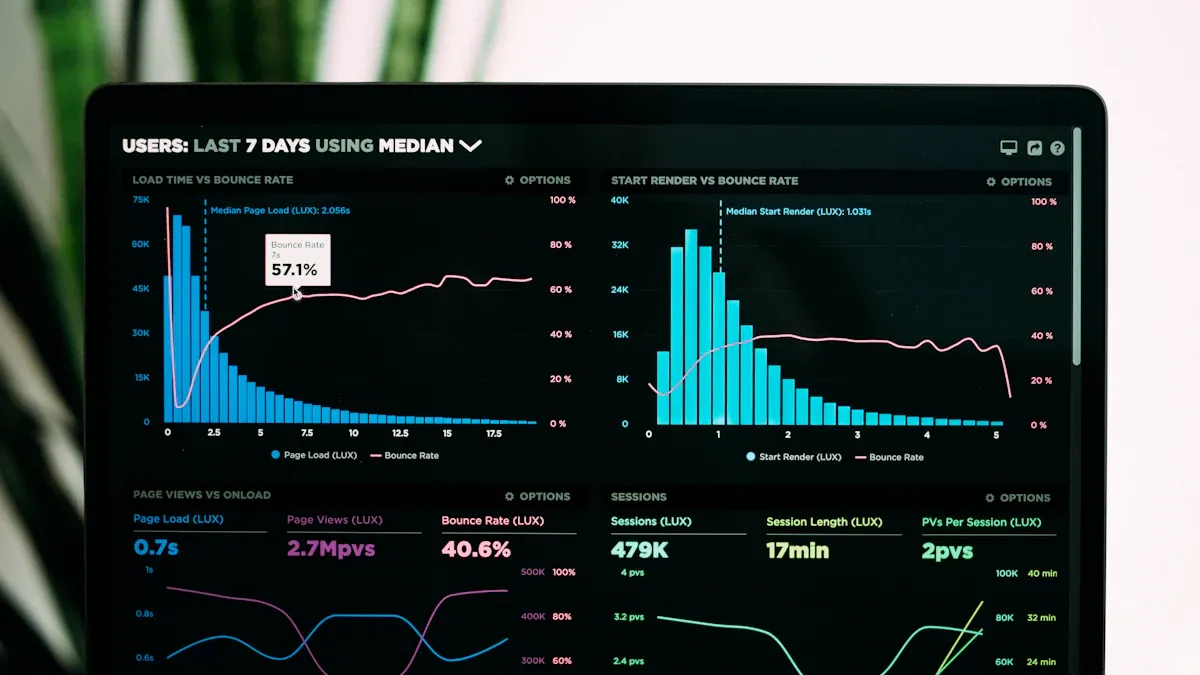
What is a Business Intelligence System and How Does It Work
A business intelligence system collects, analyzes, and visualizes data, turning raw information into actionable insights for smarter business decisions.
Lewis
Jan 04, 2026

Top 3 Retail Management Software Picks
Compare the top 3 retail management software. See features, pricing, and which solution fits your business needs for inventory and sales.
Lewis
Dec 30, 2025

What Are Enterprise BI Solutions and How Do They Work
Enterprise BI solutions unify business data, enabling real-time analytics, secure collaboration, and smarter decision-making across your organization.
Lewis
Dec 22, 2025